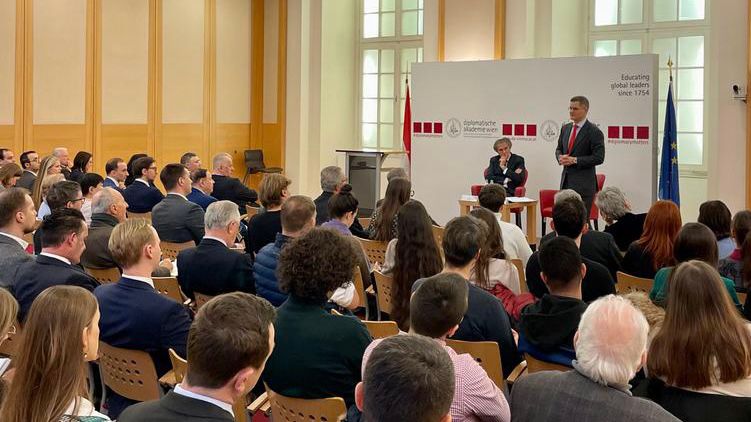At the invitation of the Diplomatic Academy in Vienna, one of the most prestigious and oldest schools on the European continent, CIRSD President Vuk Jeremić delivered a lecture entitled “(Geo)politics of the Balkans: The Revenge of History”, on February 7th, 2023.
The thought-provoking lecture—moderated by the Director of the Vienna School of International Studies Emil Brix—provided an in-depth analysis of Serbian and Balkan history and (geo)politics.
In his opening remarks, Jeremić stated that understanding the complicated geopolitics of the Balkans entails turning to history. Speaking about different religious and cultural roots of the Balkan nations, and their relations to great powers, he also touched upon the breakup of Yugoslavia, the collapse of the Soviet Union, and Fukuyama’s “End of History” theory.
Elaborating on the concept of the “Return of History”, Jeremić said that this phenomenon could be traced back to 2008 and the world’s most serious financial crisis since World War II. Additionally, other fateful events such as Russia’s invasion of Georgia and the subsequent decision to recognize Abkhazia and South Ossetia as independent states—both of which were inspired by the unilateral declaration of independence (UDI) of Kosovo—only contributed to the aforementioned historic breaking point. The last in the series of watershed events behind the return of history was the 2008 NATO summit in Bucharest, during which the alliance made the decision to further expand towards the Russian borders.
During the lecture, Jeremić stated that geopolitical processes are cyclical and consist of periods of booms, when international cooperation flourishes, and periods of busts, when there is less and less international cooperation. “The issue with geopolitical recessions is that they tend to last longer than the economic ones. So, the current situation, which emerged with the Russian invasion of Ukraine on February 24th, 2022, is going to stay with us for some time,” he noted.

Responding to a question on how current events in Ukraine are affecting the Balkan Peninsula and Serbia’s possible change of heart on sanctions against Russia, Jeremić said that Serbia’s experience under one of the harshest sanction regimes ever imposed by the UN left an indelible mark on the collective psyche of the Serbian nation. “Those who suffered the most were the ordinary people. The sanctions were meant to punish the leadership, but in reality, the powerful became more powerful, the rich became richer, and the ordinary people suffered,” Jeremić said, highlighting this as the moral argument why Serbia should remain against imposing sanctions on any nation in the world. He added that the sanctions imposed by the Western powers on the Russian Federation have not been successful and did not bring “Russia to its knees”, as expected.
As part of the interactive Q&A session, Jeremić underlined that half of the world does not recognize Kosovo and reiterated his belief that Serbia should find adequate diplomatic means to protect its territorial integrity. “I am advocating that we find ways of working together, while respecting each other’s red lines. One of our red lines is that we don’t think Kosovo’s membership in the UN would constitute an improvement of the long-term stability in the Balkans,” he explained. “History doesn’t end. At least not in our part of the world. It has never ended and juggling (between great powers) is a means of survival, not only for Serbia but for everyone else as well,” Jeremić concluded.
The event was attended by more than 120 people, among which high-ranking Austrian officials, ministers and ambassadors, top academic experts such as the esteemed Professor Jeffrey Sachs, as well as students from prestigious Viennese schools.











